From Friday night’s (11.12) season finale of Real Time with Bill Maher, via MichaelMoore.com.
Day: November 14, 2010
Straight From The Shoulder
Jean-Luc Godard was interviewed by Christian Jungen for NZZ last Sunday (11.7). The original interview is here. The edited translation is by Frederik Lang.
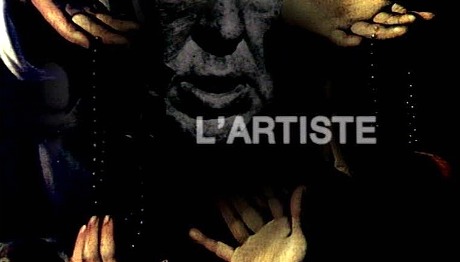
Jungen: Monsieur Godard, next Saturday [on 11.13], the Academy of Motion Picture Arts & Sciences will award you an Honorary Oscar for lifetime achievement. What does this mean to you?
Jean-Luc Godard: Nothing. If the Academy likes to do it, let them do it. But I think it’s strange. I asked myself: Which of my films have they seen? Do they actually know my films? The award is called The Governor’s Award. Does this mean that Schwarzenegger gives me the award?
Jungen: I beg your pardon? The most important film award means nothing to you?
Godard: No, it really doesn’t. Maybe it is a late acknowledgement that I — like Lafayette in the American War of Independence, in the uprising against the English — supported the beginning of a revolution.
Jungen: Which revolution?
Godard: In the 1950s, when I was a critic with Cahiers du Cinema, we loved independent films. We discovered that directors like Hitchcock, Welles and Hawks fought for artistic independence within the big studio machinery. After the war, we praised this — back then, a sacrilege for French film criticism. They sniffed at directors like Hitchcock and said ‘he’s just making commercial films.’ But for that alone, the Academy could have given the award to someone else.
Jungen: Now you are being modest. You and your colleagues developed the auteur theory that today structures the canon as works of directors.
Godard: The phrase ‘la politique des auteurs’ was made up by journalists. When Fran√ßois Truffaut wrote his first articles, he only said: The auteur of a film is not the screenplay writer — it is not the one who gets the story on paper who is important, but the one who stages it.
Jungen: In 1980, you revoked the auteur theory with a mea culpa. Why?
Godard: I suffered severely from the consequences, that they talked more about the author and not his works. That’s why I didn’t go to Cannes for the world premiere of my latest work, Film Socialisme. [Because] they would have only talked about me. But it was already like this during the Nouvelle Vague. We were no more than ten critics who spoke of films and not directors. By the way, this was a mistake: with Truffaut and Jacques Rivette, we only talked about cinema and not about ourselves. We didn’t know one another.
Jungen: Later on, you fell out with Truffaut. What was the reason?
Godard: Over time I realized that he made exactly the kind of films that we attacked: screenplay films! Truffaut’s works were not shaped by the camera but by the pen. The camera imitated what his pen had written.
Jungen: Back to the Oscar: Why don’t you attend the award ceremony?
Godard: I don’t have a visa for the US and I don’t want to apply for one. And I don’t want to fly for that long.
Jungen: Once again, there is a debate in Jewish newspapers about whether or not you are an anti-Semite. Does this hurt you?
Godard: That’s nonsense! What does ‘anti-Semite’ mean? All peoples of the Mediterranean were Semites. So anti-Semite means anti-Mediterranean. The expression was only applied to Jews after the Holocaust and WWII. It is inexact and means nothing.
Don't Think So
Due respect to Scott Feinberg (who joined Sasha Stone and I earlier today for Oscar Poker #8), but I don’t believe Rooney Mara, strong as she is in The Social Network, would register as a Best Supporting Actress contender even if she was in fact campaigning. That’s because her character, Erica Albright, delivers only one emotion in the film — i..e, disdain and repulsion for Jesse Eisenberg‘s Mark Zuckerberg. And because she doesn’t participate in the greater Facebook conflict scheme, and is therefore of limited interest.

News from Pawhuska
Tulsa World posted two photos today of Terrence Malick, Javier Bardem and Ben Affleck — collaborators on Malick’s latest film, which is untitled but has something to do with fishing. They’re shown hanging on a street in Pawhuska, Oklahoma. They tell us, at least, that Bardem is playing a bespectacled priest or minister.
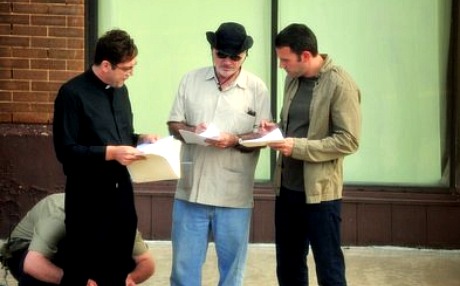
(l. to r.) Javier Bardem, Terrence Malick, Ben Affleck during filming of Malick’s untitled “romantic drama.”
“It’s unknown what the movie is about,” reports Tulsa World‘s Michael Smith, “outside of a nebulous description as a love story. Filming began in October in Bartlesville, then moved to Pawhuska for a time, with shooting also taking place in Tulsa at a refinery and at Tulsa International Airport.
The costars are Rachel Weisz, Rachel McAdams and Barry Pepper.
Why, I wonder, hasn’t a serious stealth photographer visited the set and taken a decent photo of Malick? It couldn’t be that hard. The last full-face smiling shot of the secretive, Sasquatch-like director happened during filming of The Thin Red Line some 12 years ago . Isn’t it about time for a new one? Only one person has had fewer photos taken of him/herself than Malick, and that’s Nikki Finke.
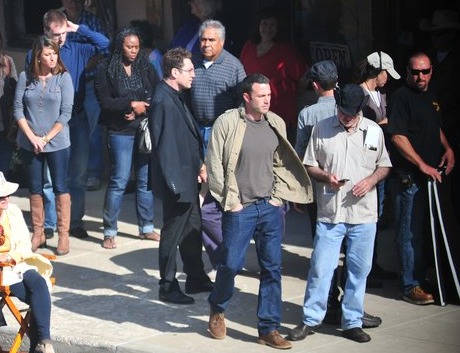
Pawhuska is the county seat of Osage County, Oklahoma. The population was 3,629 at the 2000 census. The late Ben Johnson (“Sam the Lion” in The Last Picture Show) is probably the most notable native. Tracy Letts‘ Pulitzer Prize-winning play August: Osage County is set on a farm near Pawhuska.
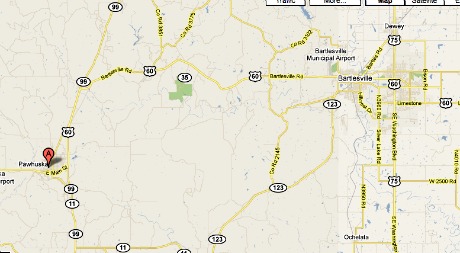
Fetish
Nobody in the world is more queer than myself for color photos taken on the sets of films shot in black-and-white. I would kill to see a couple of robust color snaps of Paul Newman hanging with Jackie Gleason and George C. Scott during the making of The Hustler. Or of Burt Lancaster and Kirk Douglas between takes on Seven Days in May. A rich color capturing of Peter Lorre and Michael Curtiz and Dooley Wilson and Humphrey Bogart on a sound-stage set of Casablanca would be heaven.
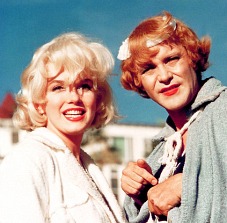
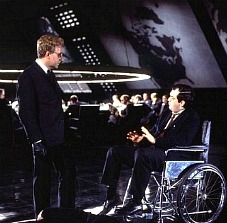
(l.) Marilyn Monroe, Jack Lemmon, Some Like It Hot; (r.) Dr. Stranglelove shot of Peter Sellers and Stanley Kubrick copied from a column on Ain’t It Cool.
Or a nice color snap of John Wayne, Montgomery Clift, John Ireland and Howard Hawks shooting the shit between takes of Red River . Or one of Hawks and Cary Grant, Thomas Mitchell and Jean Arthur on the set of Only Angels Have Wings. Or color shots of Marlon Brando and Eliza Kazan and Eva Marie Saint on the Hoboken docks during the shooting of On The Waterfront. Anything along these lines would be great. If anyone has any scans or sources of any kind, please forward.
Hayden Again
I wrote yesterday that the late Sterling Hayden was “one of the most spiritual” actors I’d ever had the pleasure to know or speak with. And a guy named shanes5 asked what I meant so I replied this morning as follows:
There are the rote facts of life, the plain material truth of things, and then there are the currents within. The singing angels, the demons, the fireflies, the banshees, the echoes, the dreams…the vague sense of a continuing infinite scheme and how we fit into that. Every last one of us can define our lives as a constant mixing of these two aspects, but the charm and final value of a person, for me, is about how much he/she seems to be cognizant of and dealing with the interior world, and how much he/she comments and refers to those currents and laughs about them, and basically lives on the flow of that realm.
Some go there more frequently or deeply than others, and some are just matter-of-fact types who let their spiritual side leak out in small little droplets from time to time, but Sterling Hayden, by my sights, was almost entirely about those currents.
He never just said, “I’d like a little sugar in my coffee” and let it go at that. Well, he would…but if you asked him to expand upon that notion he would just take off and you’d just sit back and marvel. Hayden knew various coffees and coffee growers and had walked through coffee plantations in the Caribbean at dawn and he knew all about how sugar was refined and would speak metaphorically about the sweetness of sugar being the enticement but coffee being the reality of it all, the bean from the earth, the bean that needed to turn brown and then be ground down and prepared just so, and then he’d be off on some tangent that took the coffee-vs.-sugar metaphor and ran with it, or took it and jumped off a cliff as it were.
Hayden was a fascinating, hungry and obviously vulnerable man, insecure and ridden with guilt about naming names in the ’50s, jolly or surly depending on the time of day, very singular, a great contentious bear of a man, unsettled, always the thinker, certainly a poet or a man trying all the time to be one, a man of the sea and a boy in some ways. He and Patti Smith would have gotten along famously. He loved pot. And he loved his Johnnie Walker Red. We were once speaking about his role as the farmer in Bernardo Bertolucci‘s 1900 and he started to talk about his final line in the film, which he wrote, and I said it before he did — “I’ve always loved the wind” — and he loved that. He chuckled and patted my knee and said “God love ya.”
My Soul Wilts
I know how difficult it can be to keep the ball in the air when you’re doing an interview, so I’m not faulting David Poland‘s way with talent as far as that aspect is concerned. I’m certainly no expert at the form and am hardly one to talk. Poland keeps it going and the ball is definitely batted back and forth. The problem is that what results is a kind of frothy intellectual fervor with everyone grinning and chuckling in a way that feels simultaneously loose and manic and aimless.
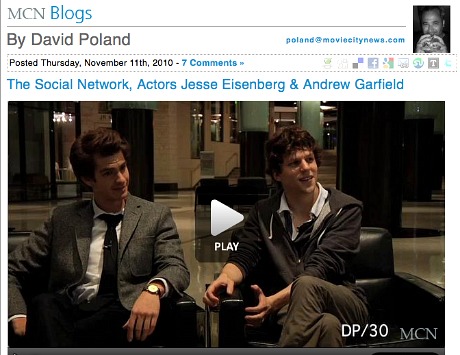
Too much alpha chuckling can be an unwelcome thing, and I don’t mind saying that Poland’s relentless chuckling can feel truly oppressive at times. After a while it can feel like a form of torture.
What happens in these DP/30 interviews is that people talk a lot — expressively at times and certainly at great length — but every so often they drive me crazy because it hits me that all I’m watching is a lot of chuckling and effusive blather because Poland’s questions are sometimes inane and forced and/or anxious, and because nobody’s really saying anything. It’s Poland going ‘bee-duh-bee-duh-bee-bee-bee-bee’ and the interview subject going ‘well, okay, hold on…I’m going to answer you, of course, but I want to slow it down a bit.”
It’s like some kind of polar opposite of that vibrant atmosphere that Tom Snyder had going with Sterling Hayden way back when.
Banana Republic
In his current N.Y. Times column, Frank Rich asks “whether the country can afford the systemic damage being done by the ever-growing income inequality between the wealthiest Americans and everyone else, whether poor, middle class or even rich. That burden is inflicted not just on the debt but on the very idea of America — our Horatio Alger faith in social mobility over plutocracy, our belief that our brand of can-do capitalism brings about innovation and growth, and our fundamental sense of fairness.”
Rich is echoing, of course, the more-or-less-accepted notion that America has become South America — a country ruled by super-elite haves with vastly different interests and goals than those of the rest of society. Which is the same point made by Arianna Huffington‘s “Third World America.” And by N.Y. Times columnist Paul Krugman when he said we’ve become “a banana republic with nukes.”
“‘How can hedge-fund managers who are pulling down billions sometimes pay a lower tax rate than do their secretaries?’ ask the political scientists Jacob S. Hacker (of Yale) and Paul Pierson (University of California, Berkeley) in their deservedly lauded new book, ‘Winner-Take-All Politics.’ If you want to cry real tears about the American dream — as opposed to the self-canonizing tears of John Boehner — read this book and weep. The authors’ answer to that question and others amounts to a devastating indictment of both parties.
“Their ample empirical evidence, some of which I’m citing here, proves that America’s ever-widening income inequality was not an inevitable by-product of the modern megacorporation, or of globalization, or of the advent of the new tech-driven economy, or of a growing education gap. (Yes, the very rich often have fancy degrees, but so do those in many income levels below them.) Inequality is instead the result of specific policies, including tax policies, championed by Washington Democrats and Republicans alike as they conducted a bidding war for high-rolling donors in election after election.”
Love and Death
Poor Morning Glory should have made at least $20 million this weekend, but it only took in $12 million and change. Why people see what they see and don’t see what they don’t want to see is a mystery at times. (The critics probably helped kill it to some degree.) But Tony Scott‘s Unstoppable came in second with $24 million — good but not great.
My feeling is that Unstoppable is a great action film for the first two-thirds, but then it gets a little too rah-rah and mechanistic during the last third. And the HE community thought what? Here’s a good piece about Scott by “Actionman.”
